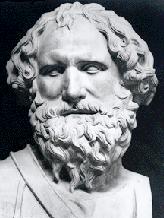Archimedes
 From Conservapedia
From Conservapedia Archimedes (287 BC – 212 BC) was an ancient Greek mathematician, physicist, engineer, astronomer, and philosopher. Even today's math is based on his work: Archimedes Principle, the value of "pi", etc. Born in Syracuse, Sicily, he did much of his work for Hiero, the tyrant of Syracuse.
Archimedes’ most famous (though not the greatest) accomplishment was when Hiero became suspicious that a crown made for him by his goldsmith was diluted with silver. Not knowing what to do, he turned to Archimedes for help. Archimedes realized that if there was silver in the crown it would displace more water than would be displaced by gold of an equal weight. As it turned out, the king's fears were justified; the goldsmith had cheated after all.
Archimedes also discovered the "Archimedes' principle," allegedly when he was sitting in a bathtub one day, recognizing that volume of a body can be measured by seeing how much the water rises when the body is submerged. He supposedly ran into town naked from his bathtub declaring “Eureka!”, meaning “I have found it!”
Archimedes did a tremendous amount of ground-breaking work on levers and pulleys, enabling the Greeks to move heavier things than ever before. He once bragged “give me a place to stand on, and I will move the earth”. He also invented the Archimedes screw, a device (consisting of a large screw inside a pipe) still used in irrigation today. Despite all this, he considered his greatest accomplishment to be his two-volume work, On the Sphere and Cylinder. In this work, he used the method of exhaustion to estimate the area of a circle and the volume of a sphere by successive approximations. This method is a precursor to the development of calculus, 2000 years later. He had a diagram of a sphere and cylinder engraved from this work on his tombstone when he died. In 2005, a palimpsest was examined using X-ray technology to uncover some heretofore undiscovered works, including the Stomachion, the most significant known use of combinatorics in the ancient world.
An apocryphal story about the end of his life recounts that in 212 B.C., the Roman army under command of General Marcellus succeeded in invading Syracuse, Archimedes' home. Archimedes reportedly was absorbed in concentration, drawing figures in the dirt with a stick when a Roman soldier demanded he surrender. Archimedes refused, saying his calculations were not yet complete and was slain on the spot contrary to the order of a Roman commander to spare his life.
External links[edit]
Categories: [Ancient Greece] [Engineering] [Mathematicians]
↧ Download as ZWI file | Last modified: 02/18/2023 10:00:06 | 49 views
☰ Source: https://www.conservapedia.com/Archimedes | License: CC BY-SA 3.0
 ZWI signed:
ZWI signed:

 KSF
KSF